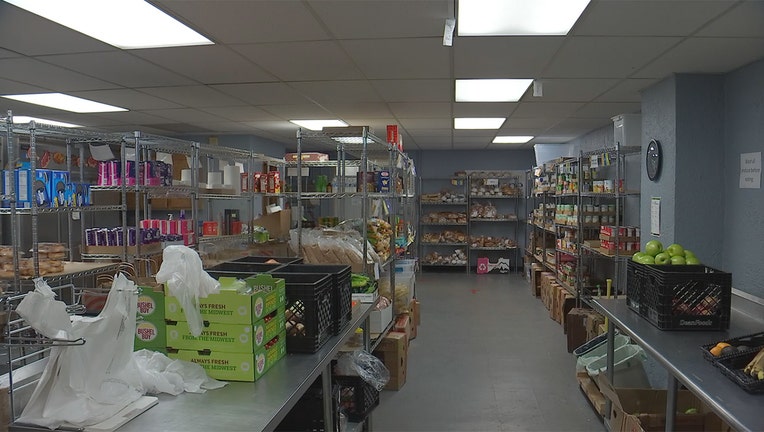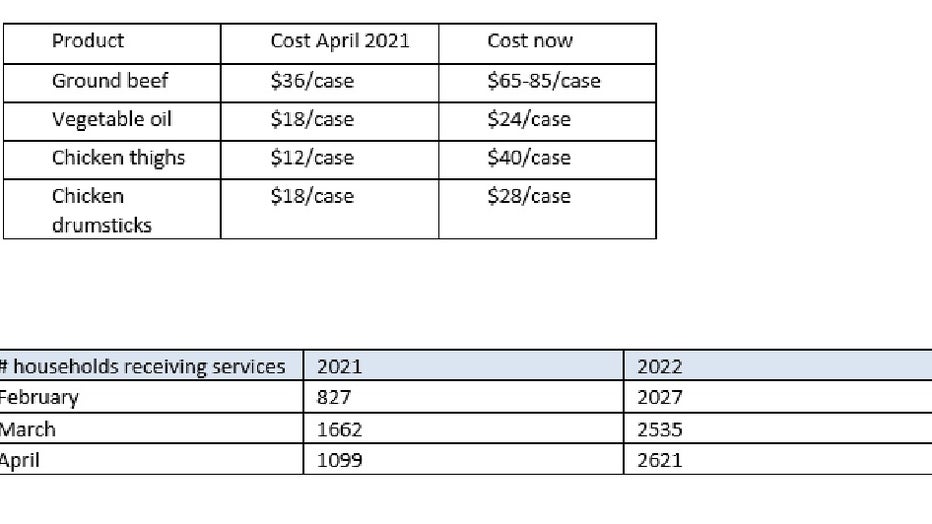Food shelves face emptier shelves than ever amid skyrocketing demand for services

Food banks are facing emptier shelves and demand for assistance skyrockets in Minnesota. (FOX 9)
MINNEAPOLIS (FOX 9) - As consumers are noticing higher food and gas prices, food shelves are feeling that impact just as much.
At Keystone Community Services, the shelves are emptier than ever, and the demand for their services continues to increase. President and CEO Mary McKeown is calling it "the perfect storm."
"We just need the community's help to make sure that we have enough food available for everyone who comes to our doors," McKeown said.
The St. Paul food shelf is serving more than double the number of families from last year. McKeown said there has been an increase in households every month since August 2021.
"It's been going up every month -- the numbers of people coming to us, as well as the number of new people," she explained.
In April 2021, 1,099 households used Keystone’s services, compared to 2,621 in April 2022.
"I would have never ever dreamt that I was going to be in this situation ever," said Fran Brown, who uses Keystone's services.
Brown started coming to Keystone after he was hit with a string of financial hardships about five years ago, from losing his job to his car being stolen. He gets now some help delivered to his front door on the first Wednesday of each month.
"I was just calculating in my head today -- the groceries that I had delivered to me I don't think I would have been able to afford to purchase them," Brown said.

Along with rising food costs, gas prices are now at a record high in Minnesota. Food banks told Fox 9 they're experiencing the same challenges as consumers, plus labor prices and supply chain issues.
"Our prices over the last year overall are up 18 percent and then in the last three months, they've been as high as 35 percent," said Pat Pearson, director of agency relations at Second Harvest Heartland.
Second Harvest Heartland said these pressures are mounting as federal supports sunset, like school meal waivers. But they're committed to continuing to provide food and not to pass on costs to their partners like Keystone.
"You can't be a good worker, you can't be a good student, you can't be a good community member if you don't have enough food," McKeown said.
Asking for that help can be extremely difficult, but take it from Brown -- who knows firsthand -- and they’re not alone.
"A lot of the concern that they may have like I did will be quickly alleviated. You'll feel so comfortable. Your dignity is not challenged," Brown said.
Here is a list of Keystone’s most needed items:
• Culturally-specific items: rice, chili paste, masa flour, soy sauce, vermicelli noodles, fish sauce
• Baby items: Diapers, baby wipes, baby food, formula, baby lotion, baby toothbrushes
• Women’s items: menstrual pads, tampons, deodorant, shampoo, conditioner, razors, lotion
• Food shelf items: canned goods (soup, meat, fish, beans, fruit, veggies), quick to eat (granola bars, peanut butter, microwave meals), culturally specific (rice, soy sauce, vermicelli noodles), cooking (flour, sugar, oil, milk alternatives), baby items (diapers, wipes, baby food, formula) and personal care (soap, lotion, toilet paper, toothpaste)
• Personal care items: toilet paper, lotion, toothpaste, soap, garbage bags, deodorant
• School supplies: backpacks of all sizes, notebooks, pocket folders, scientific calculator, glue sticks and bottles, rulers
Community members can drop off donations at the Midway Food Shelf or the Rice Street Food Shelf on Mondays, Tuesdays, Thursdays and Fridays from 9 a.m. to 4 p.m. and on Wednesdays from 9 a.m. to noon.

